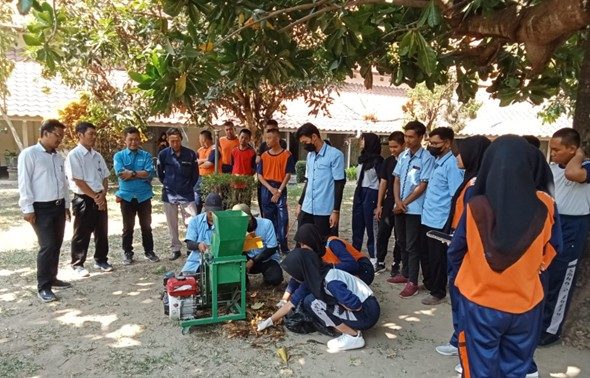Yogyakarta, October 12, 2023. The Waste Management Task Force from the Faculty of Biology actively participates in guiding the management of organic waste to support the National Green School Program (Adiwiyata) at SMK N 2 Jetis Yogyakarta. Adiwiyata Schools are environmentally conscious institutions that aim to create a healthy, clean, and beautiful environment. The Adiwiyata program aims to shape environmentally conscious and culturally aware schools capable of participating in and implementing environmental preservation efforts and sustainable development for the benefit of both present and future generations. “This year, SMK N 2 Jetis Yogyakarta has received recognition as a National-level Adiwiyata School,” stated the Head of School, Mr. Dodot Yuliantoro, S.Pd., MT.
The one-day workshop held on Wednesday, October 12, 2023, was attended by the School Principal, Vice Principal, Adiwiyata Teachers, Adiwiyata Students, and school cleaning staff. The workshop covered (1) General waste management presented by Soenarwan Hery Poerwanto, S.Si., M.Kes, who is also the Chairman of the Organic Waste Management Task Force at the Faculty of Biology UGM (2) Organic waste processing through various methods such as Vermicomposting, Fermentation (Bioferti 2023), POC production, and maggot cultivation using the stacked bucket method, as well as eco-enzyme production presented by Dwi Umi Siswanti, S.Si., M.Sc., who is also an Expert on the Waste Management Task Force from the Faculty of Biology (3) Practical composting using the Bioferti 2023 probiotic, with guidance from Suharjito and Danang from the Waste Management Task Force at the Faculty of Biology UGM. Participants showed great enthusiasm in attending the workshop and engaging in hands-on practice of organic waste processing, including shredding, mixing with the Bioferti 2023 probiotic with specific compositions, and using the starter culture. “Composting organic waste using Bioferti 2023, a probiotic from the Faculty of Biology, can degrade organic waste in about 7 to 14 days, and the resulting fertilizer meets the standards for community use,” said Suharjito during the compost-making practice. Guidance on organic waste processing will continue until the school’s cleaning staff and Adiwiyata program are self-sufficient in waste management.
The accompanying program by the Organic Waste Management Task Force at SMKN 2 Jetis, Yogyakarta, is one of the efforts to realize Sustainable Development Goals (SDGs) 3 (Good Health and Well Being) and SDGs 11 (Sustainable Cities and Communities). The Faculty of Biology at UGM hopes that the school will become self-reliant in managing both organic and inorganic waste (shp, 2023).




